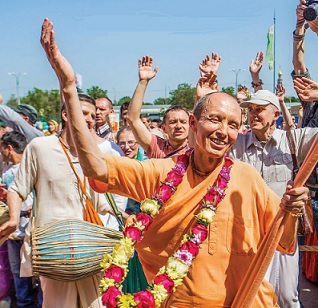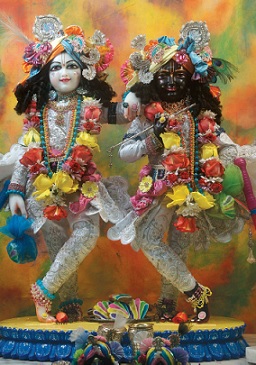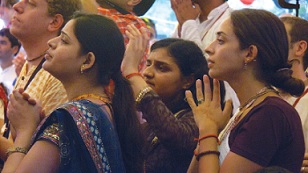
For relief from life's inevitable distress, we need to stop looking in all the wrong places.
In ISKCON we often speak of “taking shelter” of Lord Krishna or His devotees. For example, a new member who has expressed his or her interest in a particular initiating spiritual master is said to have “taken shelter” of that guru. And every morning at centers around the world, members glorify the sacred tulasi plant, proclaiming that all who take shelter of her will have their desires fulfilled. A similar proclivity is found among other Vaisnava groups. As their maha-mantra, members of the Vallabha sampradaya chant Sri Krishna Saranam mama, claiming the Lord as their only shelter. But what does it really mean to take shelter? And if we’re supposed to turn only to Krishna or His devotees for shelter, to whom (or what) should we not turn?
Perhaps the most precise English equivalent of the Sanskrit term Saranam is “refuge.” Merriam-Webster defines refuge as “protection from danger or distress” or “something to which one has recourse in difficulty.” Etymologically, the word indicates an escape. All of this accurately conveys the sense of the word shelter in the devotional context. Taking shelter is about what you do when you are upset, or tired, or depressed. For children, the answer is usually straightforward. Whenever my three-year-old daughter trips and falls, or has had a sleepless night, my wife and I know what to expect: “Mama, baba, can you pick me up?” For adults, unfortunately, running to our mommies or daddies is generally not an option. Yet we experience as much distress as children, and – given our amazing ability to induce unwarranted mental anguish – likely more. To whom, then, should we run? The Vaisnava scriptures provide an emphatic and singular answer: Lord Sri Krishna , the Supreme Personality of Godhead and our original and eternal father. Indeed, Krishna ’s ultimate instruction in the Bhagavadgita is mam ekam Saranam vraja – “Come to Me as your only shelter.”
For followers of Sri Caitanya Mahaprabhu, the prescription is even more specific: seek refuge in the Lord’s holy name. Thus, we know the only real cure for our material blues is to immerse ourselves in the chanting of the Hare Krishna maha-mantra. Still, most of us reflexively fall back on other sources of solace. Specifically, we use food, sleep, intoxicants, sex, and various selfprotective measures to negate what is disturbing us and provide some pleasure in its place. Srila Prabhupada characterized these activities – eating, sleeping, mating, and defending – as animalistic: in some ways unavoidable for humans as living organisms, but secondary to the finer features that distinguish us from the beasts. As it turns out, we can understand the specific vows that he asked ISKCON members to take at initiation, as well as his general instructions to minimize our basic bodily activities, as a way of redirecting our reliance on these temporary means of escape to reliance on the infallible feet of Lord Krishna as our only true salvation.
Physical Proection
Let’s start with the most primal urge, fear. Prompted by fear, we defend ourselves, using clothing and dwellings to protect us from the elements, and weapons and walls to protect us from other beings. These measures constitute shelter in its most literal form. They are necessary, no doubt, but they can involve great expense and endeavor. That is why Srila Prabhupada encouraged his followers with families to live in farm communities, where they could shelter their bodies in simple homes made from indigenous materials and use the rest of their time in seeking shelter for their souls. As he states in his commentary to Srimad-Bhagavatam (2.2.4):
The necessities of life for the protection and comfort of the body must not be unnecessarily increased. . . . The reserve energy of human life, which is far superior to that of animals, should simply be utilized for self-realization. . . . Great sages and saints in the days of yore were not living in palatial buildings furnished with good furniture and socalled amenities of life. They used to live in huts and groves and sit on the flat ground, and yet they have left immense treasures of high knowledge with all perfection.
The Bhagavatam also relates the history of young Prahlada, whose only protection – from the tridents of fiends, the stomping feet of elephants, the bite of fearful snakes, body-crushing boulders, and exposure to extreme heat, cold, and wind – was his unflinching faith in and meditation on Lord Krishna .
Psychological Escape
But shelter is about more than physical protection; those harried by life’s struggles often also long for psychological escape. For this, many people turn to sleep and intoxication. After a rough day, who doesn’t like to indulge in an extra hour of shut-eye the next morning? Why should we get up and face the cruel world again, when we can peacefully lie on our beds in a soft and hazy dreamland? To be sure, it is natural to wake up from a good night’s sleep – or a well-timed nap – feeling refreshed and in better spirits. But to wallow in the semiconscious stupor of the morning hours and postpone waking up, not because one is getting necessary rest but merely to avoid encountering reality, leads only to lethargy and dullness. As Srila Prabhupada instructed, “The more one sleeps, that means he’s under the control of maya.” (Conversation, Jagannatha Puri, January 26, 1977) This is why he insisted that his followers rise at the brahma-muhürta hour, well before dawn, and seek comfort instead in the early-morning chanting of the holy names. “If you want to follow Caitanya Mahaprabhu, there is no question of sleeping in the morning.” (Conversation, Aligarh, India, October 9, 1976)

Even worse than the grogginess of superfluous sleep is the oblivion of drug and alcohol abuse. These are even more effective at neutralizing pain, but this ameliorative effect is short-lived. As Srila Prabhupada explained:
This taking shelter of intoxication is no use to get oneself free from anxieties. It is a drug. It is oblivion. For some time we forget everything, but again when you come to your consciousness the same anxieties and same things are there. So this will not help you. (Lecture, New York, January 1, 1967)
Moreover, intoxicants retard our spiritual advancement by dragging our consciousness downward:
In the mode of ignorance, people become mad. Being distressed by their circumstances, they take shelter of intoxication, and thus they sink further into ignorance. Their future in life is very dark. (Gita 14.17, Purport)
Of course, drug and alcohol addiction can also have catastrophic side-effects on one’s health and relationships. Again, Srila Prabhupada’s alternative recommendation was to become “intoxicated by Caitanya Mahaprabhu’s gift, the Hare Krishna maha-mantra.” (Caitanya-caritam®ta, adi 9.48, Purport) He explained that immersion in ecstatic chanting is the best refuge because “kirtana-rasa is the safest situation within this material world.” (Songs of the Vaisnava acaryas, Foreword)
Pleasurable Distractions
True shelter must not only block out what assails us, but must also give us a little diversion in its stead.This is where food and sex come in. In the United States, it is commonplace to speak of “comfort food.” Additionally, eating disorders often involve a progression from negative emotions to overindulgence. Thus, whether by choice or compulsion, many people turn to familiar foods – often ones high in fat and calories – when life gets stressful. They do this, not because they are hungry, but because eating soothes them and provides some pleasure amid the pain. Whereas eating nearly always has some therapeutic effect (just ask my wife about the difference in my mood before and after I’ve had lunch), this effect is meant to be incidental; when we eat primarily to induce some emotional change rather than to obtain nourishment, we can wreak havoc on our bodies. Fortunately for the members of ISKCON (and as anyone who has attended a Sunday Feast program well knows), Srila Prabhupada taught the transformation, rather than the restriction, of eating. Food that has been offered to the deity and thus become spiritualized is as good as God:

We can associate with Krishna in so many ways by chanting His holy name, by hearing His qualities and pastimes, by seeing His beautiful form in arca deity, by eating His prasada. . . . All these different items are identified with Krishna because He is the Absolute Truth. (Letter, August 18, 1970)
By eating only Krishna ’s prasada, therefore, we end up taking shelter, not of food, but rather of the Lord Himself. Far from fostering gluttony lthe great acarya Bhaktivinoda Thakura explains that this kind of eating will actually help us control our tongues. Moreover, whereas ordinary food can never really comfort us, Lord Krishna guarantees that His prasada will dissipate all of our miseries. (Gita 2.65)
Sex is an even more potent palliative than food. In the right circumstances, it is an important part of family relationships; in the wrong ones, it can become an unwholesome addiction – seemingly satisfying at first, but ultimately leaving one emotionally hollow, if not physically diseased. Hence, Srila Prabhupada warned against using intimate relations with the opposite sex as a source of comfort. (Bhag. 4.27.4, Purport) Instead, he urged us to seek relief by redirecting our attention onto the romantic dalliances of Lord Krishna :
Krishna exhibited this rasa-lila dance . . . just to captivate the conditioned soul. Since they are very much attracted by sexology, they can enjoy the same life with Krishna and thus become liberated from the material condition. . . . The pastimes and activities of Lord Krishna are medicine for the conditioned souls. If they simply hear about Krishna they become relieved from the material disease. They are addicted to material enjoyment and are accustomed to reading sex literature, but by hearing these transcendental pastimes of Krishna with the gopis, they will be relieved from material contamination. (Krishna , Chapter 33)
There is no question of artificially renouncing eating, sleeping, mating, or defending. (Lord Krishna actually warns against repression. Gita 3.33) Nor should we view these bodily activities as inherently incompatible with being a hundred percent dedicated to serving God. (Krishna explains that a yogi need only regulate them, not reject them entirely. Gita 6.17) For most of us, they are a natural and unavoidable part of our day-to-day lives. As practicing devotees, however, we should move beyond depending on food, sleep, intoxicants, sex, and self-protective measures for emotional and physical shelter; instead, we should learn to turn invariably to Lord Krishna – especially His name, but also His deity, His pastimes, and even His food remnants – for escape and comfort when we are distressed. In fact, we must ultimately relinquish our reliance on every kind of material relief or distraction. For only when we have abandoned all material shelters and find our only recourse in transcendence will we be eligible to go back home, back to Godhead.
Navina Syama Dasa is a disciple of His Holiness Bhakti Caru Swami. His family lives in ISKCON’s Radha Kalachandji community in Dallas, where he is an attorney with the United States Department of Labor and where his daughter attends TKG Academy.
